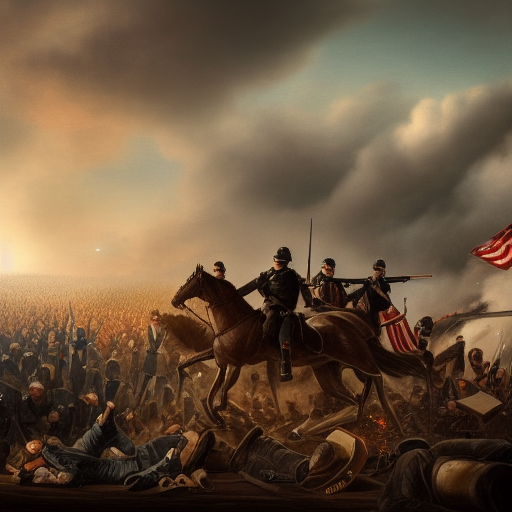
this question resolves by polling a group of scientific prediction experts at resolution time in 2035, selecting experts based on their success in scientifically respected prediction markets or a successor technology. if I detect adversarial behavior before a civil war is successfully avoided, I'll resolve market early with my best estimates of which options will actually work to avoid violence and preserve liberty and justice for all.
@tailcalled I suspect that if the market actually resolves to this then the answer isn't true. But rather the technocratic coalition has managed to thoroughly suppress dissent.
@MartinRandall while it's possible that the split results could reduce risk of civil war, I'm actually not sure we're past the key risk period, and I expect significant threat until DeSantis is naturally unpopular.
@Yev agreed - I don't think that, in retrospect if a civil war does not occur, that it will appear that the reason key actors who'd been poised to enact violence chose not to enact violence was because they expected a reliable and overwhelming response that completely destroyed everything they care about. If a game tree that clearly guarantees that starting a civil war invokes MAD could be created, then perhaps that would be sufficient to prevent one! but it seems unlikely to be a reachable option to me, because it would involve a significant change in expectations of retaliation against militiants.
@Yev I don't think strategic nuclear weapons are very useful in the sort of civil war that seems most likely in the US. Even tactical nuclear weapons would probably be counter-productive in terms of loss of popular support. I can see nuclear weapons being relevant to an eventual peace deal.
@IsaacKing part of the reason I was interested in this question is that I think that that is a weirdly low number, and I'm a lot more interested in why it's low than to bet against it.
copying a comment I made on isaac's market - things which would NOT cause me to choose the "republicans win and therefore the right-auth doesn't civil war, and repubs dismantle democracy, and repubs stop left/lib/liber from starting civil war about dismantle democracy" response:
republicans win democratically, but the supreme court limits gerrymandering sufficiently that, despite the increase in electoral imbalance, democrats can keep winning a reasonable portion of the time, and do eventually regain control. conditional on republicans-win-democratically, I do not currently expect the supreme court to limit republican gerrymandering whatsoever.
republicans win and make blatantly unconstitutional moves about what qualifies as legal voting, and the supreme court decides the moves are constitutional, triggering a violent uprising starting on the left comparable to the irish troubles (this would resolve this market N/A: a civil war was not avoided. I may need to )
republicans lose, triggering a violent uprising starting on the right comparable to the irish troubles
republicans lose, but somehow the right doesn't initiate widespread violence (which would be surprising to me, and would bump my probability that one of this market's avoidance descriptions occurred)
We're positing a "boring" outcome; it seems likely to be attributed a "boring" explanation (even if the true explanation is less boring). (On the other hand, experts may be incentivized to present a narrative in which they have nonboring insights to share, which may tend to skew analysis in the opposite direction.)
@NickAllen this seems unlikely to me (would be nice if you could buy "everything else" on a question-answer market?) - targeted censorship appears to be in the process of being made permanently impossible, and I anticipate militiants have already achieved uncensorability.
@L there's a lot of success in this area by authoritarian regimes; this answer presupposes some sort of emergency declaration and emergency powers a la FDR, or a softer version of that with complicit tech support.
@jorge too old hypothesis: https://direct.mit.edu/isec/article-abstract/43/3/53/12220/The-Demographic-Transition-Theory-of-War-Why-Young?redirectedFrom=fulltext
https://www.ncbi.nlm.nih.gov/pmc/articles/PMC2781832/
too lazy: out of 10 adults in the US, 7 are overweight including 4 that are obese: https://www.cdc.gov/nchs/fastats/obesity-overweight.htm
@egroj I could see this being significant, but I can't see it being the reason historians point to as primary.
@NickAllen you're right probably not historians, although as you can see there are already papers presenting at least "too old" as a hypothesis. In any case, all is needed is for @L to think this reason was one of the main ones that prevented the conflict
@egroj note that unless something unexpected occurs, I do not expect to resolve this for many years. the key prediction is what consensus believes historians will select when asked actively by me, not what I will choose if people start attacking the market by eg betting on suggestions like "by initiating a civil war in the first place".
in order words, I expect that if a civil war gets close to occurring, there would be incentive to fill manifold with disinfo, at which time I would resolve this market in the way that I think most conducive to stopping a civil war at time of resolution, so that even if this edge case occurs, the probabilities will resemble those of the retroactive analysis. if there are no further attacks like jan6, then an ongoing string of jan6 style attacks becomes extremely unlikely, and the question then is what proximal causes may have been major factors in such attacks not escalating into the american troubles.
as that is a very difficult question to answer solidly, I put the resolution time far in the future to allow time for scientific discussion to settle somewhat. at resolution time in 2035, I will poll historians who have good track records on major scientific prediction markets like manifold (this plan relies on prediction markets becoming popular to evaluate science; if that does not occur, I will relax the limit to published historians).
re: whether it's plausible - I think this is an extremely plausible answer for historians to pick.